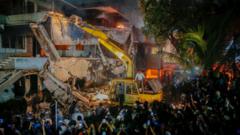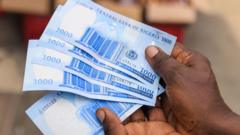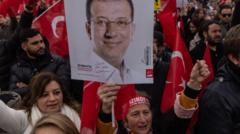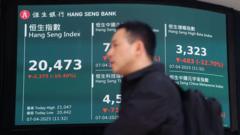Recent protests in Bangladesh against former Prime Minister Sheikh Hasina escalated into violence, with her family home and memorial sites being set ablaze as tensions rise over her legacy and government actions.
Protests Erupt in Bangladesh as Former PM's Legacy is Torched

Protests Erupt in Bangladesh as Former PM's Legacy is Torched
Demonstrators express their anger towards Sheikh Hasina by vandalizing her ancestral home amid calls for justice and accountability.
Protests in Bangladesh have erupted dramatically, culminating in demonstrators setting fire to the ancestral home of ex-Prime Minister Sheikh Hasina, along with properties belonging to other members of her party. The unrest follows Hasina's announcement of a social media address from India, where she has been living in exile since being removed from power due to student-led protests last year.
Hasina, 77, who previously held sway over Bangladesh for two decades, cultivated a reputation as an autocratic leader notorious for suppressing dissent and manipulating elections. Violence erupted on Wednesday evening, as an excavator demolished the house of her late father, Sheikh Mujibur Rahman, Bangladesh's founding president, which had been transformed into a museum in his honor.
While Rahman is remembered as a national hero, criticism against his daughter has cast a shadow over his legacy. In a Facebook livestream, Hasina reacted to the attack, claiming, "They may destroy a building, but they cannot erase history."
Once perceived as a champion of democracy, Hasina’s image has deteriorated due to allegations of electoral fraud, corruption, and severe crackdowns against protesters, which resulted in hundreds of fatalities. Arrest warrants have been issued against her following the unrest, prompting her flight to India in August of the previous year. Despite her departure, public resentment towards her and the Awami League continues to simmer.
During the protests, which drew an estimated 700 participants, demonstrators also targeted the homes and businesses of senior Awami League officials, fueled by online demands to eliminate what they termed “sites of fascism.” The police were deployed in significant numbers to manage the situation, indicating the escalating tension.
In the aftermath of Hasina’s ousting, a caretaker government led by Nobel laureate Muhammad Yunus has been attempting to stabilize the country amidst ongoing demonstrations calling for justice against Hasina for her government’s brutal repression of student protests. Compounding the challenges for Yunus's administration is a brewing economic crisis, with accusations against Hasina regarding falsifying economic data during her tenure.
Yunus has committed to conducting elections sometime between late 2025 and early 2026, but the path to restoring stability and trust in governance remains fraught with uncertainty and turmoil.





















